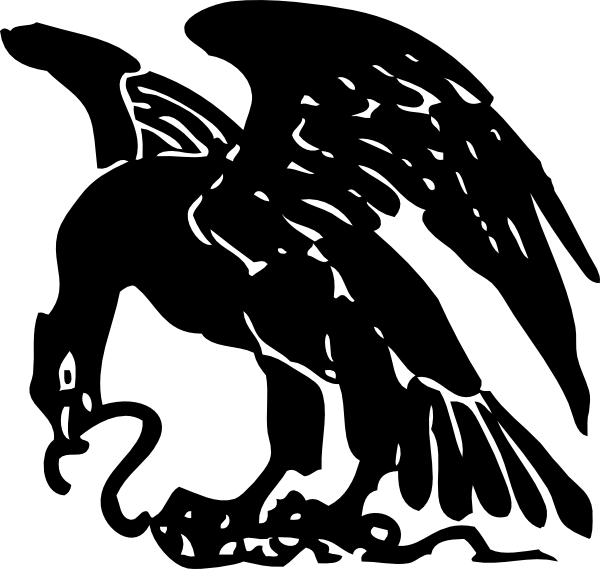
- •Kazakhstan
- •In short stories
- •Введение
- •President nursultan nazarbayev
- •I would like to talk to you about…
- •I will make sure that all children in this country get a good education by hiring more teachers and spending more on education.
- •Economy of Kazakhstan
- •Leading Industries
- •Ferrous Metal Industry
- •Chemical and Oil-Processing Industries
- •Oil and Gas Industries
- •Transport and Communications
- •Agriculture
- •Foreign Economic Relations
- •Astana (2)
- •Astana - the capital of Kazakhstan
- •Eastern Ring
- •Insert prepositions:
- •Vocabulary:
- •My Native City
- •Vocabulary:
- •Semipalatinsk
- •Nurlan Omarov, City Akim Some data
- •It was the center of Semipalatinsk region till 1997.
- •The main branches of economy
- •Vocabulary:
- •1. In the post- war years in Semipalatinsk …
- •Rakhmanov hot springs
- •Vocabulary:
- •Markakol zapovednik
- •Vocabulary:
- •The irtysh river
- •Vocabulary:
- •Town near chinese gates
- •Animals are in danger in kazakhstan
- •Some interesting facts about east kazakhstan animals live “barometers”
- •Part VII: rare birds and animals of kazakhstan (entered in “red book”) The Golden Eagle (беркут)
- •Vocabulary:
- •Demoiselle Crane (журавль-красавка)
- •Vocabulary:
- •Great white pelican (розовый пеликан)
- •Vocabulary:
- •Black stork
- •Vocabulary:
- •Environmental problems
- •Vocabulary:
- •Almaty (2)
- •Vocabulary:
- •Karaghandy (1)
- •Karagandy (2)
- •Kokshetau
- •Translate into English:
- •Petropavlovsk
- •Vocabulary:
- •Kyzylorda
- •Baikonur cosmodrome
- •Vocabulary:
- •Abai Kunanbayev (!)
- •Abai Kunanbayev (2)
- •Word 4 (1891)
- •Word 6 (1891)
- •Word 31 (1895)
- •Word 14 (1893)
- •Mukhtar Auezov (1)
- •Mukhtar Auezov (2)
- •Kurmangazy Sagyrbayev (1)
- •Kurmangazy (2)
- •1. Most verbs add – ed to form the past tense which sounds [d] or [t]. Put the verbs below into the correct column:
- •2. Some verbs add –ed to form the past tense which sounds [id]. Find these verbs in the text, write them below:
- •3. Practice saying these words. Сhokan Ualikhanov (1)
- •Chokan valikhanov (1835 —1865) (2)
- •ZhambyL Zhabayev
- •Magjan Jumabayev
- •Altynai asylmuratova
- •Vocabulary:
- •Timur bekmambetov
- •Vocabulary:
- •Rosa rymbayeva - the pride of our country (1)
- •Vocabulary:
- •Abylkhan kasteev (2)
- •Vocabulary:
- •Roza rymbayeva (2)
- •Vocabulary:
- •Kanysh satpayev (1)
- •Vocabulary:
- •Alexander vinokourov
- •Vocabulary:
- •Talgat musabayev (1)
- •Vocabulary:
- •Talgat musabayev (2)
- •Kanysh satpayev (2)
- •Vocabulary:
- •Saken seyfullin – a martyr for freedom
- •Vocabulary:
- •Nurzhuman ihtymbayev
- •Vocabulary
- •Batyrhan shukenov
- •Vocabulary:
- •Kumash nurgalievich nurgaliyev - the people's teacher (1925-1988)
- •Vocabulary:
- •He is the best forward of the world fans
- •Vocabulary:
- •Shakharim kudiberdiev
- •Vocabuary:
- •Kazakhstan: Culture Back to Top
- •State holidays and national holidays. Meals of the people living in kazakhstan
- •Vocabulary:
- •Housing: the yurt
- •Vocabulary:
- •Traditions and customs
- •Vocabulary:
- •Cutting the hobble
- •Vocabulary:
- •Maslenitsa
- •Vocabulary:
- •Kelin Tusiru
- •Shildekhana
- •Cultural norms in kazakstan
- •The magic of old jewelry
- •Vocabulary:
- •Kazakh music culture
- •Asian games (asiads)
- •Vocabulary:
- •Sports and games in kazakhstan
- •Vocabulary:
- •In the Past the life and well-being of Kazakhs depended on their strength, endurance and courage. So, special attention was paid to teaching young generation good qualities.
- •Arkan tartu (tug–of –war)
- •Altybakan
- •To participate
- •National horse-sport games
- •Vocabulary:
- •Baige (horse race)
- •Vocabulary:
- •Vocabulary:
- •Vocabulary:
- •Kazakh National cooking
- •Vocabulary:
- •Sorpa in the kazakh manner
- •Kuyrdak
- •What is kazakh food like?
- •History and food.
- •Food for religious and holiday celebrations.
- •Kazakh Traditional Dishes
- •3. The meat is …
- •The kazakh legend of the lame onager (koulan)
- •Aldar kose and the snake
- •Vocabulary:
- •A deceived fat man
- •Vocabulary:
- •Intellect, science and happiness
- •My country (1)
- •I’m proud of my state.
- •It is so beautiful and great!
- •It has a lot of limitless steppes, high mountains,
- •My country (2)
- •My motherland
- •I love my country
- •Kazakhstan is good
- •Oh, my luckless kazakh
- •Oh, kazakhstan, I’m in love with you!
- •I love you deeply, dear land,
- •We love you, dear Kazakhstan
- •Addressing to a friend
- •Do the Clothes Make the Man?
- •The Rooster and the Peacock
- •There’s No Use Crying Over Spilled Milk!
- •The Elephant and the Monkey
- •The Nightingale, the Spider, and the Bat
- •The Three Bears
- •The Wolf, the Fox and the Donkey
- •What’s Tastier?
- •The Eagle and the Raven
- •Traditions and customs
- •Cutting the hobble
- •Sorpa in the Kazakh Manner
- •Во второе издание тексты и задания добавили:
- •Составители сборника:
- •Редакционная коллегия:
- •Выражаем особую благодарность
- •Literature:
- •Рецензия
Kazakh Traditional Dishes
The main traditional dish of kazakhs is besbarmak. It is mostly served for the guests and eaten by hands (bes barmak- means five fingers). Besbarmak is usually cooked of fat mutton and parts of smoked horse meat and horse delicacies like kazy and shyzhyk. The meat is boiled and separately is boiled thin paste. Boiled parts of meat are put on the paste and spiced with a special flavoring called tuzdyk. As the custom demands the host serves the meal in special crockery- tabak. The bastabak, which is placed before the most honourable guests is used to serve the mutton head, zhambas, horse meat delicacy and other fatty parts.The esteemed guest (usually the oldest one) cuts bits and parts from the head and offers them to the other guests at the table. The secret of distribution of parts of the meat from the head lies in traditional wishes. When given the plate, it expresses the wish – “be wise and eloquent “, the larynx – a gift to sing, skin of forehead – “be the first among equals “. Meanwhile one or-two dzhigits (young man), sitting next to the esteemed quest start cutting the boiled parts of meat to pieces and the dish is again spiced with tuzdyk. The quests are offered to help themselves to the dish.
Put the sentences in the correct order:
The meat is boiled and separately is boiled thin paste.
The esteemed guest (usually the oldest one) cuts bits and parts from the head and offers them to the other guests at the table.
The main traditional dish of the Kazakhs is besbarmak.
Besbarmak is usually cooked of fat mutton and parts of smoked horse meat and horse delicacies like Kasy and shyzhyk.
The guests are offered to help themselves to the dish.
The secret of distribution of parts of the meat from the head lies in traditional wishes.
Choose the right word:
1. The main traditional dish of Kazakhs is …
bauyrsak
kuyrdak
besbarmak
2. Besbarmak is eaten with …
hands
four fingers
five fingers
3. The meat is …
fried
boiled
cooked
4. The bastabak is plased before the most …
respectful guests
constant guests
honorable guests
5. Mean while one or two, sitting next to the esteemed guest, start culting the boiled parts of meat to pieces and the dish is again spiced with tuzdyk.
women
girls
young men
Match the words:
1. traditional a. meat
2. smoked b. guests
3. boiled c. dish
4. special d. horse
5. honourable e. parts
6. fatty f. to pieces
7. cut g. flavouring
PART XV: LEGENDS
The kazakh legend of the lame onager (koulan)
O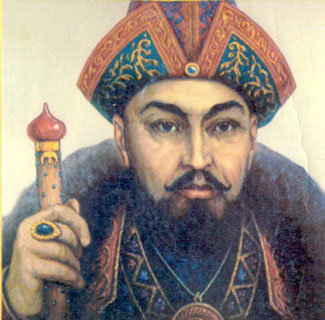
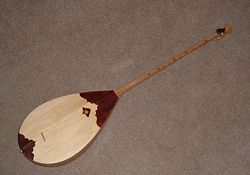 nce
the son of the Great Golden Horde khan Zhoshy (Dzhoushie) was
hunting the wild onagers. Zhoshy was so much interested in the
process of hunting and arrow shooting that he didn’t notice when
he had left his suite behind him. The prince hit the aims just to
the point and there was no mercy towards the poor animals. The
leader of the wild onager herd was very brave and strong. The lame
onager was his name. He wasn’t afraid of the wolves. He got his
name because of his battle with the beasts. The beasts had injured
the onager’s leg. So, the onager suddenly turned back and attacked
the prince. The attack of the lame leader was so impudent and fierce
that Zhoshy fell off the horse, broke his neck and died. The herd of
the onagers became free from the chase and ran away into the steppe.
The onagers’ leader was at the head as before.
nce
the son of the Great Golden Horde khan Zhoshy (Dzhoushie) was
hunting the wild onagers. Zhoshy was so much interested in the
process of hunting and arrow shooting that he didn’t notice when
he had left his suite behind him. The prince hit the aims just to
the point and there was no mercy towards the poor animals. The
leader of the wild onager herd was very brave and strong. The lame
onager was his name. He wasn’t afraid of the wolves. He got his
name because of his battle with the beasts. The beasts had injured
the onager’s leg. So, the onager suddenly turned back and attacked
the prince. The attack of the lame leader was so impudent and fierce
that Zhoshy fell off the horse, broke his neck and died. The herd of
the onagers became free from the chase and ran away into the steppe.
The onagers’ leader was at the head as before.
Nobody of the suite dared to tell the Great Golden Horde khan about his son’s death as there was an awful custom to execute the one who used to bring bad news. There lived an aged man Ketbouk who was very wise. People called him Ouly Zhirshy because he was the famous singer’s son. So, Ouly Zhorshy is the native name for “the famous singer’s son”. Thus, that aged man Ketbouk by name carved a dombra (Kazakh stringed folk instrument) out of a birch tree and drew the strings. Then he came to the Great Khan’s palace and kneeled in front of the throne. The master felt that the guest came to his palace because of the bad reason. So, the khan asked him gloomily what the great singer wanted. Without saying a word the singer began to play his birch dombra. The melody was very sad. It was called (and is still called) kyui. That kyui was telling about the young prince’s hunt and his meeting the onager herd grazing in the spring steppe. The onagers’ leader had been lucky and had managed to lead the herd away the chase a lot of times. But not that very time. The danger was very serious. The prince’s arrows caught up the mares and the issue. Soon the killing bow arrows stroke the herd and the horsemen were nearly to seize the animals. To escape the danger the lame onager at the cost of his life turned back and attacked the chasing prince. The prince was thrown down to the ground. That was the death of the young khan’s son. The singer stopped playing the dombra. Although he pronounced no word the Great Khan as well as all the rest understood everything. So sad did the dombra play! The instrument sang about the clatter of the onagers’ hoofs, about onagers’ anxiety for their foals, about the strength and wisdom of the lame onager that tried to save his herd. The dombra was particularly sorrowful while singing about the lame onager’s attack against the prince. The khan kept silent for a long time. His suite didn’t dare to utter a word. At last the Great Khan said “You told me the bad news without pronouncing a word. Then let the dombra be punished but not you. Fill it up with lead!”
T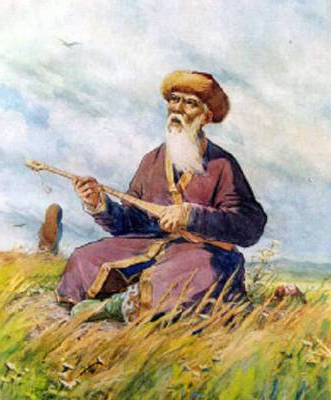 hus,
owing to the wise man Ketbouk the Great Golden Khan was informed
about his son’s death despite the terrible custom. Since then the
flat side of the dombra has had an opening (a hole) as the sign of
its guilt for the bad news about the prince’s death.
hus,
owing to the wise man Ketbouk the Great Golden Khan was informed
about his son’s death despite the terrible custom. Since then the
flat side of the dombra has had an opening (a hole) as the sign of
its guilt for the bad news about the prince’s death.
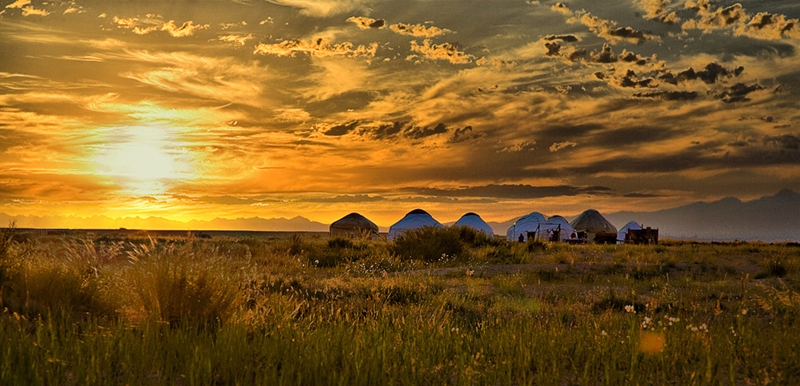
Read the story. Order these sentences and retell the story:
Thus, the Great Golden Khan was informed about his son’s death despite the terrible custom.
Without saying a word the singer began to play his birch dombra.
The onager suddenly turned back and attacked the prince.
The herd of the onagers became free from the chase and ran away into the steppe.
Although he pronounced no word the Great Khan as well as all the rest understood everything.
Zhoshy fell off the horse, broke his neck and died.
He didn’t notice when he had left his suite behind him.
Nobody of the suite dared to tell the Great Golden Horde khan about his son’s death.
There lived an aged man Ketbouk who was very wise.
Then he came to the Great Khan’s palace and kneeled in front of the throne.
Once the son of the Great Golden Horde khan Zhoshy was hunting the wild onagers.
(Keys: 1k, 2g, 3c, 4f, 5d, 6h, 7i, 8j, 9b,10,e, 11a)
Give the English equivalents to the following words and word combination:
Свита
Стрельба из лука
Стадо
Повредить ногу
Хромой
Погоня
Казнить
Старец
Пастись
Ценою своей жизни
Make up your own sentences with them.
Try to explain the following words by means of English:
an onager
a horseman
a dombra
the issue
Ouly Zhirshy
Answer the question:
Why did people call the aged man Ouly Zhirshy?
